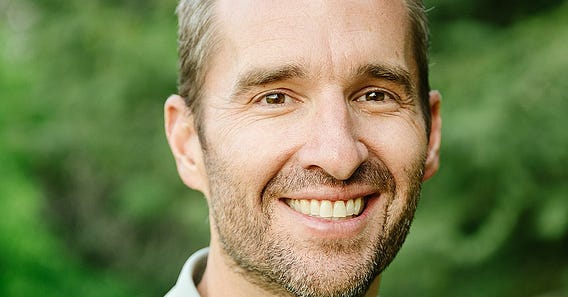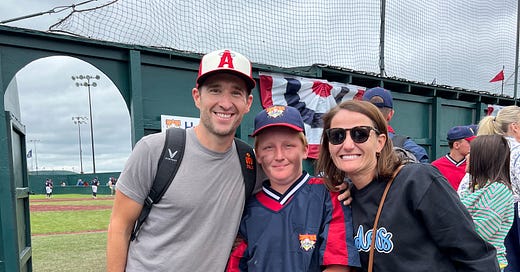Seven years ago I wrote about the Vacation Test in my newsletter. It's this simple idea that vacations provide clarity on how you really feel about your career choices.
I've learned that returning to work after time away will leave you either more or less excited about your job. That time away provides clarity. Distance. Space. I’ve had vacations where I’m thrilled to roll up my sleeves and dive back in. I’ve had vacations where, upon returning, the idea of going back to the office creates knots in my stomach. I just want to crawl in a hole and hide.
This weekend I got back from a trip to the east coast with my 12-year-old. We watched the Yankees, Mets, and Phillies play. I visited Palmyra and the hill Cumorah, two places that are dear to my faith. But the real highlight, at least for my son, was a baseball tournament in Cooperstown. I (mostly) unplugged from work and tried to soak it all in. I tried to be fully present.
On the flight home, I thought about the challenges and opportunities that awaited me at work. I had a lot on my plate, but I was eager to tackle the work head-on. I felt renewed.
Maybe it’s just me, but if a week away from the day-to-day grind doesn’t energize you and make you feel more enthused about your work, it may be time to examine why. Are the problems at work energizing, interesting, and challenging? Do you feel like you’re using your natural gifts and talents?
If you answered no to either of these questions, maybe jumping back into work feels daunting because your job is just really hard. You may be learning at a rapid pace and developing new skills that will help your future. Or maybe you don’t love the work but need the salary to provide for your family. Or the job market is uncertain. These are all fair.
The goal of the Vacation Test isn’t to make you feel bad about work. It’s to provide space to think. It’s to provide separation from the day-to-day grind. Creating space provides clarity of thought.
No vacation? No problem.
The good news is, you don’t need a vacation to Hawaii or the Bahamas to create space. Many years ago, I was evaluating an important career decision. It was stressing me out. My job paid a good salary and I was respected by my team. But I was dying inside.
I was given an offer to take a bigger role a smaller company. Less pay. More risk. Exciting work. But I wasn’t alone. I had family and financial responsibilities. There were many factors to consider. I lost sleep over the decision.
A friend of mine came to the rescue. He invited me to take a day off from work, rent a hotel room, and spend the day thinking and journaling. He challenged me to leave behind all technology. He told me that both physical and mental separation from my day-to-day activities would provide the clarity I needed.
I accepted his invitation. And he was right. The physical change of scenery made a big difference. I carved out two hours to ponder and write. During that period I was able to see my situation clearly. I could evaluate what was right for me and my family. I accepted the job offer. It proved to be an excellent decision.
Sometimes we’re so close to our own challenges that we can’t see things clearly. When you’re in this situation, I urge you on vacation. If you can’t go on vacation, rent a hotel room for a night. If you can’t do that, go to a public library with just a notebook. If you can’t do that, find a quiet room and shut your phone off. Find a way to disconnect. See your situation from a new, clearer perspective.
Create space to think. You owe this to yourself.
What I’m Learning
I recently finished reading Matt Fitzgerald’s book, The Other Talent: The Curiously Complex Role of Mental Health in Athletic Greatness. It’s a terrible title for what was a fascinating read.
Fitzgerald makes the case that to achieve greatness in sports, having physical talent isn’t enough. You must possess two mental attributes: having a screw loose and your crap together.
Screw Loose. This refers to a kind of obsessiveness, intensity, or irrational drive that pushes athletes to do what most people wouldn’t—or couldn’t—do. Having a screw loose is what gets you out of bed at 4:30am for a brutal workout. It’s what makes you push through pain when everything in your body says stop.
Crap Together. This is about having emotional control, discipline, and self-management. It's the grounding that keeps the obsessive drive from turning self-destructive. This is what keeps you from overtraining, burning out, or letting pressure ruin you. It’s the part of you that knows how to navigate setbacks and stay focused on the bigger picture.
You may be wondering, what does this have to do with me? Candidly, I’ve seen the same thing in top CEOs. The combo of “Screw Loose, Crap Together” is inherent in all great founders and executives. To reach the top, it’s not enough to be talented. You have to be be willing to outwork everyone and become emotionally resilient and disciplined. This path isn’t for everyone.
Fitzgerald wraps the book by arguing that we owe it to ourselves to maximize the talents and abilities we’ve been given.
I fully agree. And as I argue here, happiness in life comes from these three steps: 1) Discovering your innate talents, 2) Spending time developing them, 3) Using your talents to bless the lives of others.
I was recently a guest on the Smashing the Plateau podcast with David Shriner-Cahn where we discussed how I’ve navigated career transitions from Finance to HR to becoming an exec coach.
Here’s a link to the full interview.
Gratitudes
I’ve found power in regularly expressing gratitude so I’ll continue the habit. I’m grateful for fathers. I’m grateful to have an awesome dad. He taught me to love God and love others. He taught me the importance of hard work. He showed me what it means to be a man. I’m also grateful for my father-in-law and all he’s done to support and strengthen me and my wife.
I’m grateful to have so many good examples in my life. And I’m grateful to be a dad. It hasn’t always been easy, but I can’t think of anything more rewarding. The world needs more great dads. I’m doing my best every day to live up to that.
If I can do anything to help you, please reach out. As always, thank you for reading.
All the best,
Nathan
Read my book, The Unconquerable Leader | Learn about coaching
If this was forwarded to you and you'd like to sign up, click here















